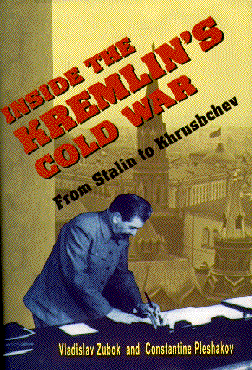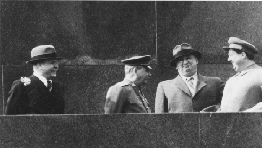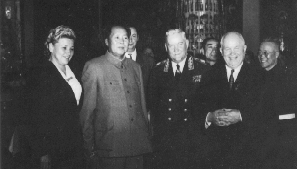 Inside the Kremlin's Cold War
Inside the Kremlin's Cold War
From Stalin to Khrushchev
Vladislav Zubok and Constantine Pleshakov
Harvard University Press
320 pp. / 8 halftones
ISBN 0-674-45531-2 (cloth)
ISBN 0-674-45532-0 (paper)
 Inside the Kremlin's Cold War
Inside the Kremlin's Cold War
320 pp. / 8 halftones
ISBN 0-674-45531-2 (cloth)
ISBN 0-674-45532-0 (paper)
[Inside the Kremlin's Cold War] [Praise for Inside the Kremlin's Cold War]
 During the peak years of the Cold War, when the inscrutability of the Kremlin's agenda left many western observers fearing
imminent nuclear war, Americans could only speculate about what Soviet leaders might be thinking and planning. What were the
Soviets' true intentions? Did they have a comprehensive strategy in their confrontation with the West? Was there a Communist
blueprint for every action, or were they engaging in the same cautious realpolitik that leaders in the West practiced so well?
Now, with the publication of this book, we are in a position to know. Using recently uncovered archival materials, personal interviews,
and a broad familiarity with Russian culture, two young Russian historians have written a major interpretation of the Cold War as seen from the Soviet shore.
During the peak years of the Cold War, when the inscrutability of the Kremlin's agenda left many western observers fearing
imminent nuclear war, Americans could only speculate about what Soviet leaders might be thinking and planning. What were the
Soviets' true intentions? Did they have a comprehensive strategy in their confrontation with the West? Was there a Communist
blueprint for every action, or were they engaging in the same cautious realpolitik that leaders in the West practiced so well?
Now, with the publication of this book, we are in a position to know. Using recently uncovered archival materials, personal interviews,
and a broad familiarity with Russian culture, two young Russian historians have written a major interpretation of the Cold War as seen from the Soviet shore.

 Covering the volatile period from 1945 to 1962, Zubok and Pleshakov explore the personalities and motivations of the key people who directed
Soviet political life and shaped Soviet foreign policy. They begin with the fearsome figure of Joseph Stalin, who was driven by the dual dream
of a Communist revolution and a global empire. They reveal the scope and limits of Stalin's ambitions by taking us into the world of his
closest subordinates, the ruthless and unimaginative foreign minister Molotov and the Party's chief propagandist, Zhdanov, a man
brimming with hubris and missionary zeal. The authors expose the machinations of the much-feared secret police chief Beria and
the party cadre manager Malenkov, who tried but failed to set Soviet policies on a different course after Stalin's death. Finally, they document
the motives and actions of the self-made and self-confident Nikita Khrushchev, full of Russian pride and party dogma, who overturned many of
Stalin's ploicies with bold strategizing on a global scale. The authors show how, despite such attempts to change Soviet diplomacy, Stalin's
legacy continued to divide Germany and Europe, and led the Soviets to the split with Maoist China and to the Cuban missile crisis.
Covering the volatile period from 1945 to 1962, Zubok and Pleshakov explore the personalities and motivations of the key people who directed
Soviet political life and shaped Soviet foreign policy. They begin with the fearsome figure of Joseph Stalin, who was driven by the dual dream
of a Communist revolution and a global empire. They reveal the scope and limits of Stalin's ambitions by taking us into the world of his
closest subordinates, the ruthless and unimaginative foreign minister Molotov and the Party's chief propagandist, Zhdanov, a man
brimming with hubris and missionary zeal. The authors expose the machinations of the much-feared secret police chief Beria and
the party cadre manager Malenkov, who tried but failed to set Soviet policies on a different course after Stalin's death. Finally, they document
the motives and actions of the self-made and self-confident Nikita Khrushchev, full of Russian pride and party dogma, who overturned many of
Stalin's ploicies with bold strategizing on a global scale. The authors show how, despite such attempts to change Soviet diplomacy, Stalin's
legacy continued to divide Germany and Europe, and led the Soviets to the split with Maoist China and to the Cuban missile crisis.

 Zubok and Pleshakov's groundbreaking work reveals how Soviet statesmen conceived and conducted their rivalry with the West within the
context of their own domestic and global concerns and aspirations. The authors persuasively demonstrate that the Soviet leaders
did not seek a conflict with the United States, yet failed to prevent it or bring it to a conclusion. They also document why and how Kremlin
policy makers, cautious and scheming as they were, triggered the gravest crises of the Cold War in Korea, Berlin, and Cuba. Taking
us into the corridors of the Kremlin and the minds of its leaders, Zubok and Pleshakov present intimate portraits of the men who made
the West fear, to reveal why and how they acted as they did.
Zubok and Pleshakov's groundbreaking work reveals how Soviet statesmen conceived and conducted their rivalry with the West within the
context of their own domestic and global concerns and aspirations. The authors persuasively demonstrate that the Soviet leaders
did not seek a conflict with the United States, yet failed to prevent it or bring it to a conclusion. They also document why and how Kremlin
policy makers, cautious and scheming as they were, triggered the gravest crises of the Cold War in Korea, Berlin, and Cuba. Taking
us into the corridors of the Kremlin and the minds of its leaders, Zubok and Pleshakov present intimate portraits of the men who made
the West fear, to reveal why and how they acted as they did.
Praise for Inside the Kremlin's Cold War
 "Two of Russia's most accomplished Cold War historians have brought us a treasure trove of arresting new information,
insights, and judgements that do much to change our understanding of the Soviet Union's motives and behavior during its long and tragic confrontation
with the West."
"Two of Russia's most accomplished Cold War historians have brought us a treasure trove of arresting new information,
insights, and judgements that do much to change our understanding of the Soviet Union's motives and behavior during its long and tragic confrontation
with the West."
--Michael R. Beschloss, author of The Crisis Years: Kennedy and Khrushchev, 1960-1963
 "At last we can see the politics of the Cold War on the Soviet side as well as the Western side. Zubok and Pleshakov
turn 'the Kremlin' into a real place populated by real politicians. Their book shows what Soviet archives have begun to reveal about
the other side of the 'long twilight struggle'."
"At last we can see the politics of the Cold War on the Soviet side as well as the Western side. Zubok and Pleshakov
turn 'the Kremlin' into a real place populated by real politicians. Their book shows what Soviet archives have begun to reveal about
the other side of the 'long twilight struggle'."
--Ernest R. May, Harvard University
 "This book breaks ground in two important ways: it is the first account of the early Cold War written primarily from
Soviet sources; and it is the first opportunity young Russian historians have had to state their views, in English, on what the Cold War
was all about. Zubok and Pleshakov are the best of this new generation of post-Soviet scholars. Inside the Kremlin's Cold War
is certain to influence the writing--and re-writing--of Cold War history for years to come."
"This book breaks ground in two important ways: it is the first account of the early Cold War written primarily from
Soviet sources; and it is the first opportunity young Russian historians have had to state their views, in English, on what the Cold War
was all about. Zubok and Pleshakov are the best of this new generation of post-Soviet scholars. Inside the Kremlin's Cold War
is certain to influence the writing--and re-writing--of Cold War history for years to come."
--John Lewis Gaddis, Ohio University
 "Utilizing a host of new material, Zubok and Pleshakov offer many insights into the causes and early years of the
Cold War. Their Well-written account will interest not just historians, but any reader who seeks a better understanding of why the United States
and the Soviet Union engaged in costly and dangerous rivalry for more than four decades."
"Utilizing a host of new material, Zubok and Pleshakov offer many insights into the causes and early years of the
Cold War. Their Well-written account will interest not just historians, but any reader who seeks a better understanding of why the United States
and the Soviet Union engaged in costly and dangerous rivalry for more than four decades."
--John F. Matlock, former ambassador to the USSR and author of Autopsy on an Empire